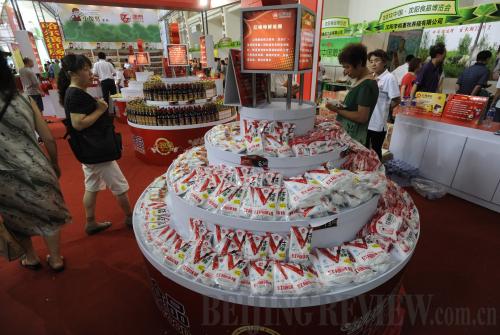|
 |
|
FLAVOR FESTIVAL: An array of seasonings on display at 2012 Shenyang China Food Expo (CFP) |
Monosodium glutamate (MSG), a flavor enhancer, is the latest target in China's ongoing trade wars. On October 24, the U.S. Department of Commerce announced an anti-dumping and countervailing investigation into imports of MSG from China and Indonesia, requested by Ajinomoto North America Inc., the U.S. unit of Japan's Ajinomoto Corp.
The Illinois-based company claimed that MSG from China and Indonesia was sold in the United States at less than fair value, with dumping margins ranging from 64.8 percent to 204.7 percent, and 50.3 percent to 58.7 percent respectively, and that manufacturers in these two countries had received improper government subsidies.
"There is a reasonable indication that a U.S. industry is materially injured by reason of imports of monosodium glutamate from China and Indonesia that are allegedly subsidized and sold in the United States at less than fair value," said all six commissioners of the U.S. International Trade Commission (USITC) on November 15.
It was the third such case in September, following the U.S. Department of Commerce's final decision to slap anti-dumping and countervailing duties on imports of hardwood, plywood and a statement to probe imports of trichloroisocyanuric acid from China.
The U.S. Department of Commerce will continue its investigations and make preliminary anti-dumping and countervailing duties determinations on December 27, 2013 and March 12, 2014 separately.
Accusations rebuffed
China has been the leading manufacturer of MSG since 1992. From 2002 to 2010, the sector expanded at an annual growth rate of 11.1 percent. According to statistics by the U.S. Department of Commerce, China exported MSG worth $36.9 million to the United States, slightly declining from that in 2011, but still double the volume in 2010.
Xu Zheng, a lawyer from Jincheng Tongda and Neal Law Firm, told International Business Daily that the main stakeholders in this case were Meihua Group, Lotus MSG, Linghua Group and Fufeng Group.
Meihua, the largest of the four, exports 100,000 tons of MSG to overseas markets each year, with 20,000 tons being sold in the U.S. market. Its big customers include Nestle and Unilever. Since MSG makes up a very small part of their production costs, these bulk buyers are not sensitive to price increases.
Yet, things are different for Lotus MSG. According to its bi-annual report in the first half year, overseas market contributed 306 million yuan ($50.21 million) to its revenue of 1.14 billion yuan ($185.36 million), accounting for 27.71 percent.
Ma Wenfeng, an agricultural analyst from Beijing Orient Agribusiness Consultants told International Finance News that low-cost labor in combination with low-priced American corn were the major reasons why Chinese-made MSG was more competitive in pricing.
Ma said that China had been a big buyer of American-produced corn which had been exported to China for some time, at a price lower than that in its homeland market. Even so, the Chinese Government didn't initiate an anti-dumping probe.
Although Chinese-made MSG is much cheaper than products from other countries, Chinese producers can earn profits, said the MSG branch of China Fermentation Industry Association.
| 